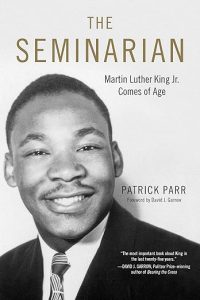 Summary: Exploration of King’s years at Crozer Seminary, from the time he was 19 to 21.
Summary: Exploration of King’s years at Crozer Seminary, from the time he was 19 to 21.
The Seminarian is the first book to deal particularly with Martin Luther King’s seminary experience. MLK was young, only 19 when he graduated from Morehouse College and started his seminary program. Crozier was also his first extended time away from home and a predominately White institution, although by the time of his graduation, about half of the small class was Black. But the institution, the professors, the administration the curriculum was White.
The Seminarian is well written and organized. It is well documented and in areas where there is necessarily speculation, that speculation is well explained and clearly understood as speculation. In addition to talking about King’s coming to maturity and grappling with his call to ministry and covering the curriculum and education at Crozier, there are two main contributions that I think The Seminarian provides to King scholarship (at least at the lay level).
First, there is lots of discussion and documentation of King’s romance with Betty Moitz, a White woman and the daughter of seminary cook. (King worked in the cafeteria so also knew Betty’s mother well.) That romance, which was very guarded, proceeded very slowly, but ended before it went too deeply. It appears that King reluctantly broke the romance off because he was encouraged to by his friends who were concerned that King would both not be able to be a preacher in the Black church with a White wife and that King would not be able to move south at all with White wife. It appears that King’s family never knew about the romance. Parr did speak to Betty Moitz and other friends of King’s at the time that did know about the romance and the discussion is something new to King scholarship.
Second, and not new to King scholarship, but I think helpfully presented, is King’s plagiarism. Parr had access to many of King’s papers and documented thoroughly that King at the time plagiarized routinely in his writing. This was both sloppy citations and presenting others work as his own. From what Parr can tell there was no example of any of his professors pushing him to do a better job citing his papers or explaining the problems of plagiarism. This was a different era, papers were mostly hand written and there were not tools for professors to check papers for plagiarism. Some reviews I have read have complained that Parr was simply trying to explain away King’s plagiarism. But I do think the discussion is helpful because while not removing King’s culpability in the plagiarism, there was a responsibility for his teachers (both at Morehouse and Crozier) to have done better job teaching the reasons for proper attribution and how to do it.
The Seminarian was not comprehensive of the three years at Crozier. As was pointed out in this Amazon review, the book really could have explored the support structure of the broader Black community. There is lots of discussion about Rev Barber, a local pastor who mentored King and allowed him to preach at his church regularly. However, the broader Black community was an area that was inadequately investigated. King is discussed preaching at local churches regularly. And how he benefited from the small income that his preaching gave (as well as how his father’s connections helped facilitate that preaching.) But what explored was mostly explored from the perspective of individuals within the Black community and not the role of the Black community itself. I do think this is likely a weakness that is a result of Parr being a White man.
I am very glad that I read this. I have been in a bit of a reading funk lately and this is the first book I have read straight through in weeks. It reminds me that I really do want to read some more of the fully length biographies of King this year. The King presented here was a real person. He played pool, and played it well. He was both rebelling from his father’s control and growing into his own calling. He was learning and exploring new ideas and new contexts. He was only 21 when he graduated, but there is a maturity here that I think does matter to his later years. Most of his classmates were much older than he was, but he was class president and in charge of the student led chapels and both his leadership roles and the older students I think did help mature him.
The Seminarian: Martin Luther King Jr. Comes of Age by Patrick Parr Purchase Links: Hardcover, Kindle Edition, Audible.com Audiobook